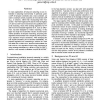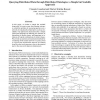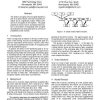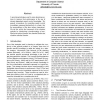IJCAI
2003
15 years 2 months ago
2003
In many applications of temporal reasoning we are in terested in reasoning incrementally In particular, given a CSP of temporal constrains and a new constraint, we want to maint...
117
Voted
IJCAI
2003
15 years 2 months ago
2003
Traditional single-agent search algorithms usually make simplifying assumptions (single search agent, stationary target, complete knowledge of the state, and sufficient time). The...
IJCAI
2003
15 years 2 months ago
2003
In this paper, we define a simple but scalable framework for peer-to-peer data sharing systems, in which the problem of answering queries over a network of semantically related p...
IJCAI
2003
15 years 2 months ago
2003
The ability to recognize when an agent abandons a plan is an open problem in the plan recognition literature and is a significant problem if these methods are to be applied in rea...
IJCAI
2003
15 years 2 months ago
2003
Graphplan planning graphs are structures widely used in modern planners. The exclusion relations calculated in the planning graph extension provide very useful information, especi...
IJCAI
2003
15 years 2 months ago
2003
We have developed a robot controller based upon a neural implementation of Norman and Shallice's model of executive attentional control in humans. A simulation illustrates ho...
133
click to vote
IJCAI
2003
15 years 2 months ago
2003
Previous algorithms to compute lexical chains suffer either from a lack of accuracy in word sense disambiguation (WSD) or from computational inefficiency. In this paper, we presen...
IJCAI
2003
15 years 2 months ago
2003
This paper presents an approach to the approximate description of univariate real-valued functions in terms of precise or imprecise reference points and interpolation between thes...
101
click to vote
IJCAI
2003
15 years 2 months ago
2003
A promising technique used in some planning systems to improve their performance is the use of domain dependent search control knowledge. We present a procedure for compiling sear...
IJCAI
2003
15 years 2 months ago
2003





